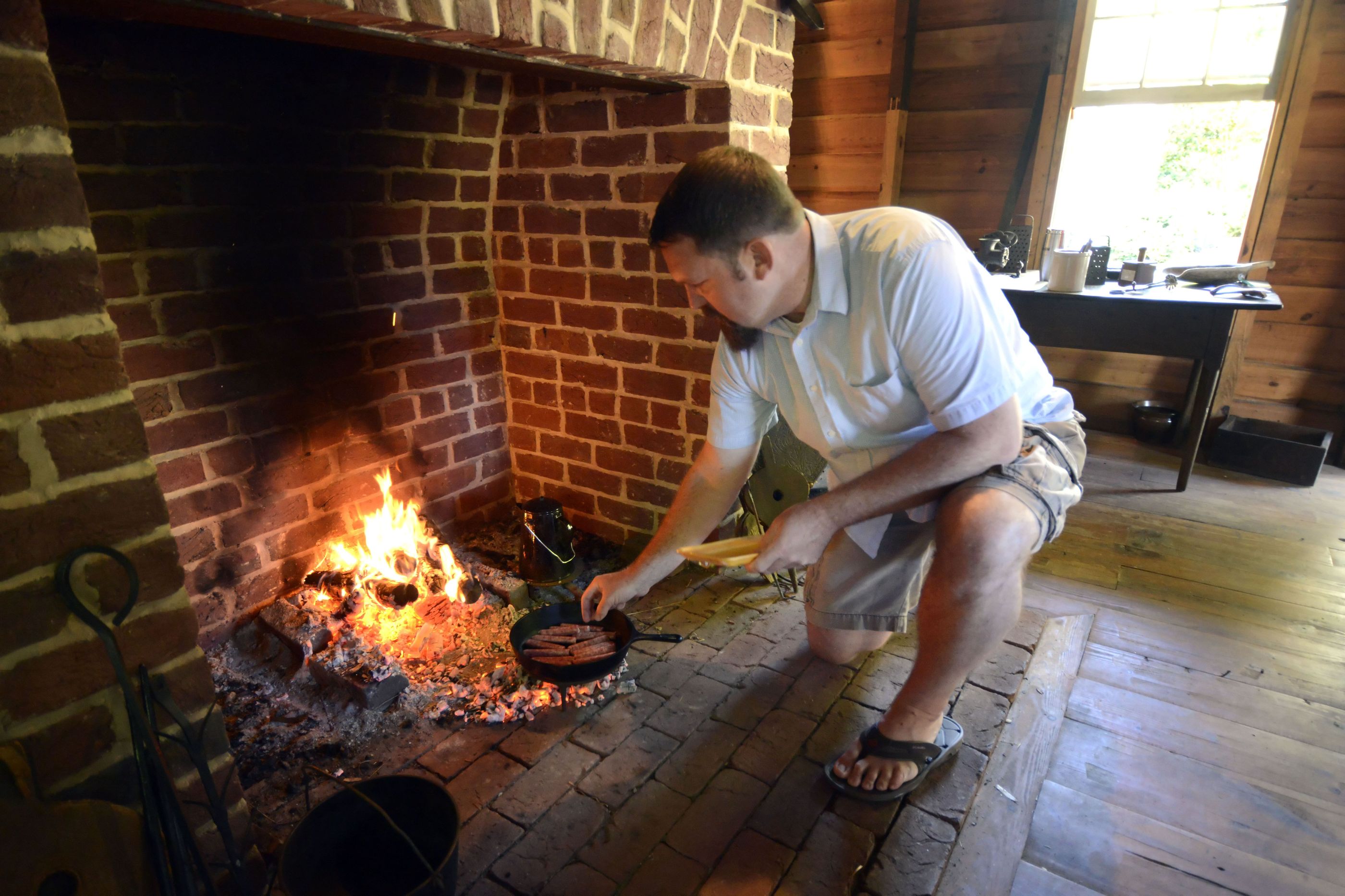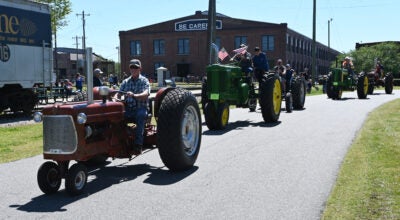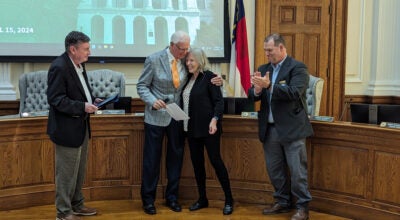For new Hall House docents, training starts with a trip back in time
Published 12:00 am Monday, May 26, 2014
SALISBURY — It takes more than a smile, a script and a period costume to be a docent.
Docents, the tour guides who lead guests through historic sites like Salisbury’s Hall House, have to know the material and be able to bring it to life, too.
Saturday, not long after the sun was up, volunteers were getting a fire started in the Hall House’s red-brick kitchen fireplace.
An enameled percolator sat on the hearth to warm coffee in the traditional way.
For people who were in a hurry, there were electric coffeepots outside.
Historic Salisbury Foundation Director Brian Davis walked outside to the garden and started picking fresh herbs.
“Rosemary, chives and parsley,” Davis said, motioning to the different plants.
Minutes later, those fresh herbs were washed, chopped and stirred into beaten eggs, which Davis then cooked in an iron skillet over hot coals.
Bacon and sausage links were already waiting on the table.
To put the new Hall House docents into the right frame of mind for their training, Davis and other volunteers started their morning with a meal as it would have been prepared when Dr. Josephus Hall’s family owned the home, from 1859 onward.
It wasn’t just something fun to do, Davis said.
Right now, the foundation — which owns the Hall House, the Salisbury Railway Depot and other sites — is looking for new ways to interpret the 194-year-old mansion for visitors.
“We’re asking … what do our visitors want to learn about?” Davis said.
And, Davis said, “culinary history is actually very popular nationwide. A lot of other historic sites have programs on culinary history.”
That’s a future possibility for the Hall House, Davis said.
“Right now, we have an exhibit on the medical history of Rowan County through 1873, when Dr. Hall died,” Davis said.
That’s why docent and volunteer Dianne Hall — no relation to the Hall House’s namesake — has prepared a notebook filled with news clippings on doctors, sanitariums and treatments that took place here.
Hall said she started volunteering at the Hall House three years ago, after hearing about the opportunity to be a docent through her chapter of the United Daughters of the Confederacy.
Today, she and her husband, Stanley “Doc” Hall, both volunteer with Historic Salisbury Foundation.
Being a docent means being knowledgeable, and prepared with additional information for those who really want to learn, Dianne said.
But being a good docent also means being able to gauge the audience and adapt the presentation to their needs, Hall said.
That’s especially true when the audience includes kids.
“I try to say to each and every (child) who comes in, ‘History is very important, don’t lose it,” Hall said.
For Nathan Rider, one of the newest Hall House docents, interacting with the public is nothing new.
In addition to performing with the Laugh Tracks comedy ensemble, Rider is a performer at the Carolina Renaissance Festival and a longtime history buff.
“When I was younger, my family and I would go on trips. Monticello, Williamsburg,” Rider said. “I was always fascinated by history in general.”
Rider said he loves learning new things and sharing information with people, so docent training was the obvious next step.
A circle of chairs outside the Hall House, next to the standalone kitchen and the herb garden, was the classroom for Saturday’s session.
Anne Lyles and other experienced volunteers led the training. Naturally, much of it involved learning facts on the house — from its early days as Salisbury Female Academy to its many years as a private residence before being purchased by the foundation in 1972.
Although the Hall House does have a Civil War cannon on its grounds, there’s more to know of the home’s history than that one period, Lyles said.
“We do this because we love the history of the house and of the county,” Lyles said.
“And, also, the history of the time,” Rider said. “A lot of Civil War sites often focus on the war itself, whereas this is more about what life would have been like.”
Longtime docent Hilda Ramseur, a retired schoolteacher, was also on hand for the training. Ramseur has been a docent with Historic Salisbury Foundation for almost 24 years.
Ramseur and Lyles sat near Rider and fellow newcomer Sue Hartgrove.
Hartgrove and her husband, Dane, have been volunteers with Historic Salisbury Foundation before, but she’s new to volunteering as a docent. A clean-up day at the Hall House in February sold her on the idea, she said.
“There’s a lot of history, and a lot of nice people, and I wanted to be a part of it,” Hartgrove said.
Aside from knowing the facts, Hartgrove said one of the biggest qualities a docent needs is enthusiasm.
Some of the facts of life in the 19th century are amazing, or crazy, to kids in the 21st century. Knowing how to pass those facts along is part of the fun.
For instance, Hartgrove said, asking kids if they can recognize what a spittoon was used for by looking at it.
Or, for that matter, a chamber pot.
“I tell them, ‘That’s where they had to use the potty!’ ” Lyles said. “And the kids say, ‘Ew! Why didn’t they just go into the bathroom?’ ”
“Because the ‘bathroom’ was outside!” Hartgrove said.
Once the training is complete and new docents feel ready, Lyles said they’re scheduled to “shadow” an experienced guide for several tours.
New docents may also start out just giving information on a single part of the house until they feel more comfortable, Lyles said.
Once they’re trained, docents may work about one weekend a month, with some volunteering for special weekday tours or the occasional school group — those happen less often nowadays due to budget cuts, Lyles said.
All told, there are about 25 docents currently active, Historic Salisbury Foundation volunteer Nancy Bilson said, but some of those only work special events such as the annual OctoberTour.
Lyles said that aside from all the training, she’s also learned facts about Salisbury and Rowan County from the guests who come to the Hall House.
Ruth Harper, a new docent who moved to North Carolina from Texas with her husband about 12 years ago, said she’s eager to get started.
“You know, I’ve always enjoyed learning how people lived in the past,” Harper said. “A lot of our young people, they don’t realize the luxuries they have.”
Being a docent is a chance to learn about culture, and then pass that knowledge on, Harper said.
“We have such a historic town,” Harper said.
Contact Hugh Fisher via the editor’s desk at 704-797-4244.





